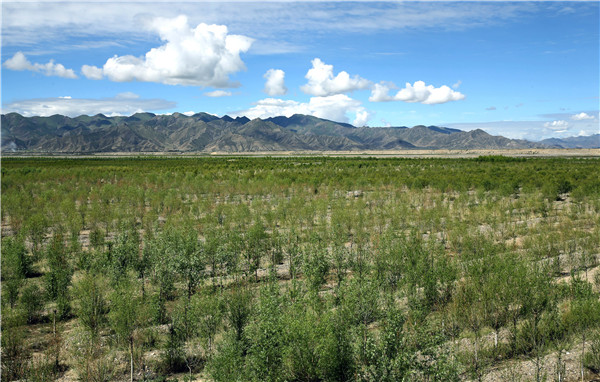Tree planting project turns barren, windy land into oasis
 |
|
The ecological demonstration area includes a combination of arbors, shrubs and grasses in barren, windy Namling county, in the Tibet autonomous region.[Photo by HUO YAN/CHINA DAILY] |
Grass, wildlife
The vegetation improves the soil, and all kinds of wild grass sprouts up under the trees. In autumn, the forest attracts wild doves, black-necked cranes, rabbits and foxes, which further contribute to the restoration of the ecology and help form a positive cycle in the ecological system.
After the development of the ecological demonstration area, the number of sandy days has been reduced by one-third, the oxygen content in the air in the area has increased 5 percent and the humidity has risen 10 percent, Namling forestry bureau data show.
Some local Tibetans did not think the trees could survive at first. Trinley, a 62-year-old farmer from Ema's Dechen village, is one of them.
"Even birds can't cross the sandy barren land during the windy winter and spring. We didn't believe trees could grow in the difficult environment," he said.
Trinley has eked out a living by planting barley, potatoes and carrots on small patches of land nourished by cow and sheep manure. He said locals had tried to plant trees for generations, but not a single tree has survived, entrenching the concept among them that trees cannot grow there.
When the government initiated the forest project, they even worried that the ecological demonstration area might eat up valuable farmland and pasture, Trinley said. "But later, we realized that the improved ecology benefits all of us."
'We see hope'
Trinley is now employed as a forest ranger, which markedly increased his income. "Seeing the trees grow, we see hope; and we become more active in taking part in planting trees and looking after the forests," he said.
Weifang helped to build a 60-hectare tree nursery in 2015. It develops saplings for the ecological demonstration area. Last year, the nursery produced 60,000 saplings worth more than 2 million yuan.
Ding Kun said the forest project and government forestry subsidy have increased incomes of many families, lifted people out of poverty and created jobs so that locals don't need work elsewhere.
Li Yang contributed to this story.





















